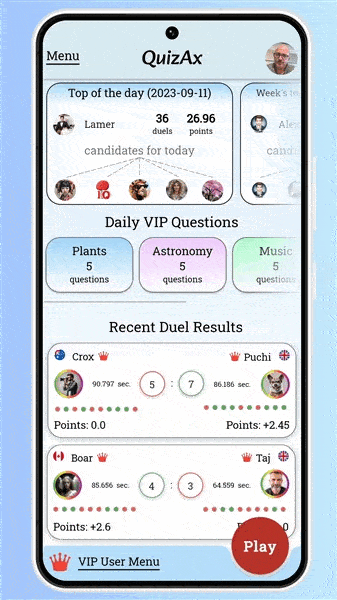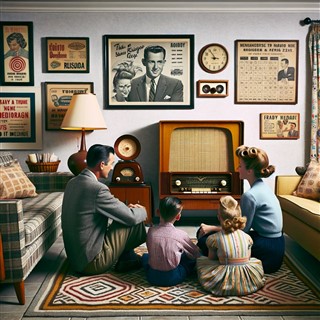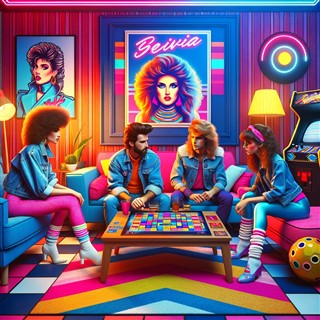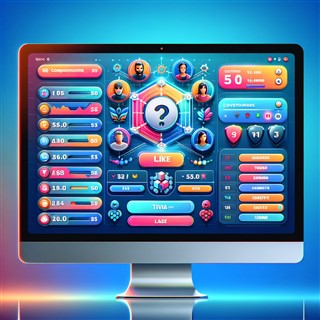QuizAx - Worldwide Quiz Duels With Real People!
Experience the thrill of multiplayer quiz games with our app, where you can challenge friends and players worldwide in real-time trivia battles.

The world of trivia, a fascinating realm where facts meet fun, has journeyed through centuries, evolving from humble parlor games to captivating online quizzes that enthral millions today. This evolution is not merely a change in the mode of play but a reflection of our inherent desire to learn, challenge ourselves, and connect with others through the power of knowledge. Quiz games, in their various forms, have been a staple in social gatherings, media, and now, in the digital world, offering a unique blend of entertainment and education. This article delves deep into the rich history of trivia, tracing its roots and witnessing its transformation through the ages.
The genesis of quiz can be traced back to the ancient civilizations where knowledge and wit were highly valued. In ancient Greece and Rome, scholars and philosophers would gather, posing challenging questions to each other, a practice that laid the groundwork for the online iq games we know today. In medieval Europe, trivia found a robust presence in the courts and academic institutions. These early trivia games were a symbol of intellect and prestige, often reserved for the educated and the elite.
The term 'trivia' itself has an interesting origin. Derived from the Latin 'trivium', it originally referred to the lower division of the seven liberal arts — grammar, logic, and rhetoric. These were considered foundational subjects, essential for any educated person. Over time, the meaning of 'trivia' evolved to denote general knowledge or facts about various subjects.
As the Renaissance swept across Europe, the appetite for knowledge grew. Trivia games during this period were not just pastimes; they became tools for learning and dissemination of information. The questions crafted during these games often revolved around literature, art, science, and the discoveries of the era. This period solidified trivia's place in the realm of intellectual pursuit and entertainment.

Transitioning into the Victorian era, trivia games began to shed their elitist roots, becoming more mainstream and a popular form of entertainment in family gatherings and social events. The Victorian parlor, a hub of family activity, became the perfect setting for quiz. These games were not only a source of amusement but also a subtle display of education and social etiquette.
Parlor trivia of this era were diverse in nature. Some were simple question-and-answer formats, while others were elaborate affairs involving acting out scenes from famous literature or historical events, testing both knowledge and creativity. It was during this time that quiz began to incorporate elements of popular culture, with questions about recent events, discoveries, and artistic achievements.
The appeal of parlor trivia games lay in their ability to bring people together, irrespective of age or social standing. They were a democratic form of entertainment, where everyone from the head of the household to the youngest child could participate and contribute. This era was instrumental in shaping the social aspect of such type of games, laying the groundwork for the inclusive and family-friendly trivia games we see today.
With the advent of the 20th century came significant technological advancements, and trivia was quick to adapt to these new mediums. The emergence of radio and later television brought it into the public domain like never before. Radio quiz shows of the early 20th century were a sensation, drawing in listeners from all walks of life. These shows were not just about testing knowledge; they were a communal experience, where families would gather around the radio, eagerly participating from their homes.
The transition to television opened up new horizons for quiz games. Television game shows transformed trivia from a listening experience to a visual spectacle. Shows like 'Jeopardy!' and 'Who Wants to Be a Millionaire?' became household names, turning trivia into a form of mass entertainment. These shows had a profound impact, making quiz a part of popular culture and a subject of daily conversation.
Television also introduced the concept of competitive trivia. Participants on these shows weren't just playing for fun; they were competing for significant prizes. This competitive element added a new layer to quiz games, making them more thrilling and engaging. The format of these shows varied, from straightforward question-and-answer to more complex formats involving strategy and risk-taking.

The dawn of the digital era marked a significant turning point for iq games. The internet and mobile technology brought about a paradigm shift, transforming trivia from a physical board or TV screen experience to a virtual one. Trivia apps like QuizAx emerged as a new platform, allowing enthusiasts to engage in brain battles anytime, anywhere.
The appeal of digital trivia games lay in their accessibility and variety. Apps offered a plethora of options, from single-player challenges to multiplayer duels and tournaments, catering to different preferences and skill levels. Players could now compete against friends, family, or random opponents across the globe, making every game a new adventure.
These apps also innovated in terms of content and format. Traditional categories like history, geography, and literature were joined by niche topics like pop culture, technology, and current events, appealing to a broader audience. Some apps introduced new gameplay mechanics, such as time limits, lifelines, and power-ups, adding excitement and unpredictability to the games.
Moreover, the digital revolution enabled the personalization of trivia experiences. Algorithms could track player preferences and performance, tailoring questions to suit individual interests and skill levels. This personal touch enhanced player engagement, making trivia games more enjoyable and addictive.
The advent of online quiz games marked the transition from a local or national pastime to a global phenomenon. These platforms broke down geographical barriers, connecting players from different cultures and backgrounds. This global connectivity enriched the trivia experience, introducing players to diverse topics and perspectives.
Online trivia games also fostered a sense of community among players. Many platforms included social features, such as chat rooms and forums, where players could discuss strategies, share knowledge, and form friendships. This social aspect was crucial in building a loyal fanbase and keeping players engaged.
Competitions and tournaments took on a new scale in the online world. Players could participate in large-scale events, competing against thousands of others for top honors. These events were not just about winning but also about being part of a larger community of trivia enthusiasts.
Additionally, online trivia and quiz games became a tool for learning and cultural exchange. Players were exposed to questions about global history, art, science, and more, broadening their knowledge and understanding of the world. This educational aspect was a key factor in the enduring popularity of online trivia.

Today's trivia landscape is characterized by its diversity and inclusivity. Modern online real-time games cater to a wide range of interests and knowledge levels, ensuring there's something for everyone. From casual players to hardcore trivia buffs, the array of topics and formats available offers a tailored experience for all.
The expansion of trivia into various subjects has been instrumental in its growth. Players can choose from traditional categories like history and geography to more contemporary ones like movies, sports, and technology. This variety not only keeps the games fresh and exciting but also appeals to a broader demographic.
Inclusivity in quiz games extends beyond topics to the players themselves. With options ranging from easy to expert, trivia games are accessible to people of all ages and backgrounds. They provide a level playing field where knowledge, not age or experience, is the key to success.
The educational value of trivia games cannot be overstated. They serve as a fun and engaging way to learn new facts and concepts. For many, trivia games are a form of informal education, enhancing memory, improving cognitive skills, and increasing general knowledge.
As we look to the future, the possibilities for trivia games are boundless. Technological advancements such as artificial intelligence, virtual reality, and augmented reality have the potential to revolutionize the way we play trivia games. These technologies could create more immersive and interactive experiences, blurring the lines between gaming and reality.
The future of trivia also lies in personalization and adaptability. With the aid of AI, trivia games could become more responsive to individual player preferences, learning styles, and skill levels. This customization would make games more engaging and effective as learning tools.
Another exciting prospect is the integration of trivia games into educational systems. By gamifying learning, quiz can be a powerful tool in classrooms, making education more enjoyable and effective. The interactive and competitive nature of trivia games can enhance student engagement and motivation.
Moreover, the social aspect of trivia games is likely to evolve further. We can expect to see more integrated social media features, allowing players to connect and share their experiences more seamlessly. Online communities around trivia games are likely to grow, providing spaces for discussion, learning, and collaboration.

The history of trivia is a testament to the human spirit's quest for knowledge, challenge, and connection. From its roots in ancient civilizations to the dynamic digital platforms of today, quiz has continually adapted to meet the changing needs and preferences of its players. As we move forward, trivia games will undoubtedly continue to evolve, but their core essence – the joy of learning and the thrill of competition – will remain timeless. Whether you are engaging in a casual game with friends or competing in a global tournament, the world of trivia offers endless possibilities for fun and learning.